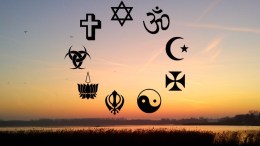Muslims will outnumber Christians by 2070, ending two millenniums of Christian dominance going back to the birth of Jesus Christ, projections released Thursday by the Pew Research Center show.
Islam is projected to grow more than twice as fast as any other major religion over the next half century because of a higher fertility rate. While Christianity will remain a dominant global religion, it will lose majority religious status in countries such as the United Kingdom, France and Australia.
Such a dramatic change raises questions about whether global conflicts between radical Muslim groups and Western nations with Christian majorities will become more inflamed in the decades ahead.
Christianity will remain the dominant religion for the United States but lose some of its share to the unaffiliated — those who claim no particular religion or who are atheists or agnostic. By 2050, one in four Americans will fall into this non-religious category, up from 16.4% in 2010, the analysis shows.
1. Christianity (General) — 2.04 Billion Followers
Most of the religious Western World (North America, Europe, and Oceania) follows this monotheistic religion based on the Bible. Above, Christian pilgrims carry wooden crosses along the Via Dolorosa during the Good Friday procession on April 22, 2011, in Jerusalem, Israel. Thousands of Christians around the world on that day marked Good Friday, which is when Christians commemorate the crucifixion of Jesus Christ. In Jerusalem, Christian pilgrims took part in processions along the route that Jesus is believed to have taken in his last days as he carried the cross.
2. Islam (General) — 1.226 Billion Followers
“Islam” literally means “submission to God” and the Quran is its holy book. Islam is most often practiced in the Middle East, Northern Africa, Central Asia, South Asia, Western Africa, the Indian subcontinent, Malay Archipelago with concentrations of worshipers in Eastern Africa, the Balkan Peninsula, Russia, and China.
3. Catholicism — 1.142 Billion Followers
For some, Catholicism refers to Christians and churches belonging to the Catholic Church in communion with the Holy See, for others it refers to continuity “back to the earliest churches,” which is claimed by other churches in mutual disputes over Christian doctrine and practice, such as the Eastern Orthodox Church, Oriental Orthodoxy, the Assyrian Church of the East, the Old Catholic Church, and the Anglican Communion.
4. Hinduism (General) — 828 Million Followers
5. Agnosticism — 639 Million Followers
Agnosticism maintains that the truth of certain religious or metaphysical claims — in particular claims about the existence of any deity — is unknown or unknowable.
6. Buddhism (General) — 367 Million Followers
Buddhism originated with Siddhartha Gautama, better known as Buddha (“the awakened one”). Buddha lived in northeastern India between the 6th and 4th centuries BC. The goal of Buddhism is to end suffering, achieve nirvana, and escape a cycle of suffering and rebirth.
7. Atheism — 150 Million Followers
David Silverman, president of the American Atheists, addresses the American Atheists National Convention in Salt Lake City on Friday, April 18, 2014. In an effort to raise awareness and attract new members, the organization held their national conference over Easter weekend in the home of The Church of Jesus Christ of Latter-day Saints.
8. Anglicanism — 85.4 Million Followers
As part of a Christian tradition mostly comprising or tied to the Church of England, Anglicans fully declared their independence from the pope at the time of the Elizabethan Religious Settlement with the Act of Supremacy of 1558.
9. Sikhism — 23.8 Million Followers
Sikhism was founded in the 15th Century in Punjab, India, on the teachings of Guru Nanak Dev and 10 successive Sikh Gurus (the last one being the sacred text Guru Granth Sahib). The word Sikh derives from the ancient Sanskrit root śiṣya meaning “disciple” or “learner,” or śikṣa meaning “instruction.”
10. Seventh-Day Adventists — 16 Million Followers
Seventh-day Adventists (SDA) are a 150-year old Christian denomination that emphasizes the central role of Jesus Christ as personal savior, high priest for all believers, and judge of all humankind. The denomination has no creed but members typically agree to 29 fundamental beliefs that cover core Christian beliefs as well as beliefs differentiating it from other sects.
11. Latter Day Saint Movement (Mormonism) — 15 Million Followers
The Latter Day Saint movement (also called the LDS movement, LDS restorationist movement, or Smith–Rigdon movement) founded by Joseph Smith in the late 1820s. Collectively, these churches have over 15 million members. The vast majority of adherents belong to The Church of Jesus Christ of Latter-day Saints (LDS Church), with their predominant theology being Mormonism.
12. Judaism — 14.5 Million Followers
Judaism stems from the Hebrew Bible, the Tanakh, and is contemplated and explained in subsequent texts such as the Talmud. The laws and commandments of God were revealed to Moses on Mount Sinai in the form of both the written and oral Torah. Karaite Judaism, however, believes that only the written Torah was revealed. Moreover, humanistic Judaism and similar humanistic moments may be considered non-theistic.
